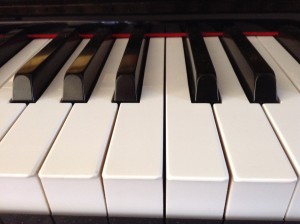
Breath trembling and vision fuzzing around the edges, I picked my way through the crowd. Messed it up. Started over. Crept away.
The kids in the front row were encouraging, and the applause was friendly, but I left that stage – my first piano recital – feeling that I’d failed.
We tell our children that making mistakes is important. It’s how we become accomplished, successful adults who handle social situations adeptly and eat job interviews for breakfast.
This is the part where I confess that the recital I’ve just told you about took place not in the dim, safe recesses of childhood – but last month.
As adults, we’re mostly able to limit ourselves to our sphere of expertise. This builds our sense that we are, generally, the grown-up people we need to be. We read the newspaper. Make sensible choices when it comes to cheese. Deliver sage advice about commitment and hard work. All of this is relatively easy, when the outcome isn’t earth-shattering. I know how to use the vacuum cleaner. I’m pretty sure I know where that semicolon goes. I understand the worth of good-quality shoes.
But what about when you’ve really, really, tried, and fall short anyway? When the outcome really matters?
Well, such situations are clearly designed to turn one into a blathering fool.
That’s certainly what happens to me every time I confess my secret ambition: to write and publish fiction. It just brings me undone. I’ve approached a publisher at an event, only to respond to polite queries about my book in monosyllabic whispers (“it’s about a boy”). Told friends and family that yes, I’ve written some stuff, and laughed it off (in that uneasy way that shouts, not laughing. Not at all). Then when the self-pity gets beyond toe-dipping and progresses to full-blown wallowing, I try to give myself the talk that I give my kids: persistence is the key. Just keep at it. Do it because you love it. And then I think: Lordy, I’d roll my eyes at me too.
Of course, lots of clever people have written about failure: its importance as part of any creative process, and its inevitability in life. I rather think Julia Gillard might have a thing or two to say about it – as, I suppose, would Kevin Rudd. Meanwhile, bestselling writer Graeme Simsion told this year’s Emerging Writers Festival in Melbourne that he’d fulfilled his dream of giving up his day job, but still found himself fretting about film rights; Melbourne author Jo Case wrote about thinking she’d have finally ‘made it’ when she published a book, only to find herself as uncertain as ever; and the philosopher Kierkegaard apparently said that anxiety (let’s assume he means the blather-inducing kind) is necessary for creativity. No matter where you’re at, it seems that success – or even satisfaction – is elusive. The Irish novelist Anne Enright put this rather beautifully when she said: “Success may be material but is also an emotion – one that is felt, not by you, but by the crowd. This is why we yearn for it, and can not have it, quite. It is not ours to hold.”
For Enright, the ultimate goal is to “meet people in their heads”. It’s not so much about whether your work is judged well (though of course you don’t want it to be junk), but whether it connects. And doing that – or even just trying to do that – is really a privilege. One is lucky to be in a position to try.
Which brings me back to the recital. Not my own part in it: fortunately, that was over pretty quickly. I’m thinking about the other performers – the kids. They played piano, drums, trumpet, guitar. They sang. Watching them, it struck me that children inhabit the first-recital stage every day. Kids are expected to put themselves out there. Often. School reports, sport, music concerts. Even shy kids find their paintings displayed on the art room wall.
But one of the great things about childhood is that although you’re forever on the first-recital stage, you’re always – in theory at least – on the way up. Being young is about potential. You don’t yet have the disadvantage of being an expert on dull things that don’t really matter (such as how to put back the toilet brush, or where to store the butter), nor do you know yet what you’re going to be good at. That’s scary, but liberating. You can just get up on stage and play – in both senses of the word. Produce the piece of music, and tinker with it. Enjoy yourself. Try, and fail, and try again, and shrug, and smile.
Of course that’s not always how it will be, for kids – but it’s how it should be. And I’m going to try to channel those kids’ performances, the next time I submit a story or find myself blathering at a publisher. Because there’s no avoiding the fact I don’t know what I’m doing. Or the fact that I still want to do it. Which means sitting down at the desk, taking a deep breath – and having a play.